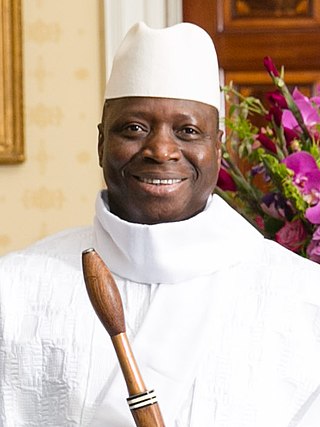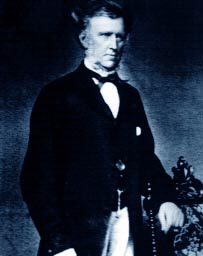Related Research Articles

The Gambia, officially the Republic of The Gambia, is a country in West Africa. Geographically, The Gambia is the smallest country in continental Africa; it is surrounded by Senegal on all sides except for the western part, which is bordered by the Atlantic Ocean.

The first written records of the region come from Arab traders in the 9th and 10th centuries. In medieval times, the region was dominated by the Trans-Saharan trade and was ruled by the Mali Empire. In the 16th century, the region came to be ruled by the Songhai Empire. The first Europeans to visit the Gambia River were the Portuguese in the 15th century, in 1447, who attempted to settle on the river banks, but no settlement of significant size was established. Descendants of the Portuguese settlers remained until the 18th century. In the late 16th century, English merchants attempted to begin a trade with the Gambia, reporting that it was "a river of secret trade and riches concealed by the Portuguese."

The Gambia followed a formal policy of non-alignment throughout most of former President Dawda Jawara's tenure. It maintained close relations with the United Kingdom, Senegal, and other African countries. The July 1994 coup strained The Gambia's relationship with Western powers, particularly the United States. Starting in 1995, President Yahya Jammeh established diplomatic relations with several additional countries, including Libya, the Republic of China, and Cuba. As scholars on Gambia's foreign policy have argued, throughout Jammeh's period, the country's foreign policy was a shifting sand, with little of direction.
"For The Gambia Our Homeland" is the national anthem of the Gambia. National anthem of the Gambia, written by Virginia Julia Howe and composed by Jeremy Frederic Howe, adopted after an international competition before independence in 1965

Yahya Abdul-Aziz Jemus Junkung Jammeh is a Gambian politician and former military officer, who served as President of the Gambia from 1996 to 2017, as well as Chairman of the Armed Forces Provisional Ruling Council from 1994 to 1996.

The music of the Gambia is closely linked musically with that of its neighbor, Senegal, which surrounds its inland frontiers completely. Among its prominent musicians is Foday Musa Suso. Mbalax is a widely known popular dance music of the Gambia and neighbouring Senegal. It fuses popular Western music and dance, with sabar, the traditional drumming and dance music of the Wolof and Serer people.

Kunta Kinteh Island, formerly called James Island and St Andrew's Island, is an island in the Gambia River, 30 km (19 mi) from the river mouth and near Juffureh in the Republic of the Gambia. Fort James is located on the island. It is less than 3.2 km from Albreda on the river's northern bank. As an important historical site in the West African slave trade, it is listed as a UNESCO World Heritage Site, together with related sites including a ruined Portuguese chapel and a colonial warehouse in Albreda, the Maurel Frères Building in Juffureh, and Fort Bullen and Six-Gun Battery, which are located at the mouth of the Gambia River.

Senegambia, officially the Senegambia Confederation or Confederation of Senegambia, was a loose confederation in the late 20th century between the West African countries of Senegal and its neighbour The Gambia, which is almost completely surrounded by Senegal. The confederation was founded on 1 February 1982 following an agreement between the two countries signed on 12 December 1981. It was intended to promote cooperation between the two countries, but was dissolved by Senegal on 30 September 1989 after The Gambia refused to move closer toward union. The Senegambia Confederation should not be confused with the historic Senegambia region, generally shortened to the Senegambia.

Charles Fitzgerald was an officer in the British Royal Navy and Governor of The Gambia from 1844 until 1847, then Governor of Western Australia from 1848 to 1855.

Islam is the major religion in the Gambia, representing 97% of the 2 million population, with the first Muslim communities in the country arriving in 11th century. Islam has therefore had an influence on the Gambia throughout history, and continues to impact its culture, society and politics. The majority of The Gambia's Muslims are Sunni belonging to the Maliki school of jurisprudence, influenced with Sufism. There is a smaller Shiite community, largely stemming from Lebanese and Arab migration. The Ahmadiyya movement is also present. Other religious societies exist in the country, including Catholics, Protestants, Hindus and Traditional African religions.

The Gambian pouched rat, also commonly known as the African giant pouched rat, is a species of nocturnal pouched rat of the giant pouched rat genus Cricetomys, in the family Nesomyidae. It is among the largest muroids in the world, growing to about 0.9 m (3 ft) long, including the tail, which makes up half of its total length. It is widespread in sub-Saharan Africa, ranging from Senegal to Kenya and from Angola to Mozambique from sea level to 2,000 m (6,600 ft).

Gambia took part in the 2008 Summer Olympics, held in Beijing, China from 8 to 24 August 2008. It was Gambia's seventh appearance in the summer Olympics since its debut in 1984. The Gambia team included three athletes; runners Suwaibou Sanneh and Fatou Tiyana as well as boxer Badou Jack. Jack, a middleweight at his first Olympics, was selected as flag bearer for both the opening and closing ceremonies. None of the Gambia athletes progressed further than the qualifying heats.
The Gambian hip hop scene is a relatively new scene in African hip hop which developed in the mid-1990s and was heavily influenced by American hip hop and Senegalese hip hop. Gambian hip-hop has been heavily influenced by international music scene including worldbeat, Senegalese wolof music, and American hip hop, as well as traditional Gambian mbalax and n'daga music. Dominican merengue and Jamaican reggae, ragga, and dancehall have also influenced the development of Gambian hip-hop.

Kombo was a kingdom and later a chieftaincy in Gambia during the colonial period. Kombo was part of the Mali Empire and gained independence after its fall, and was then ruled by the Sambou Bainunka clan. Mansa Karapha Yalli Jatta became the first King of Kombo, after seeking help from the then independent Kaabu Empire to establish the Kingdom of Kombo, he married the daughter of the Bainuk Queen Wullending Jasseh of Sanyang who sits at Gunjur and took her to Busumbala. Mansa Karapha Yalli Jatta was from the Jatta (Lion) clan who claim ancestry from Sundiata Keita the first Emperor of the Mali Empire. Kombo was ruled by two families, the Jatta (Djatta) and Bojang (Bodian) clans, when one clan becomes Mansa, the other clan gets to choose the crown prince from their own clan and vice versa. From 1840-1855 Mansa Suling Jatta was the King of Kombo, he was killed in the Soninke-Marabout war, and most of the Jatta clan moved to other regions.

Alieu Ebrima Cham Joof commonly known as Cham Joof or Alhaji Cham Joof, was a Gambian historian, politician, author, trade unionist, broadcaster, radio programme director, scout master, Pan-Africanist, lecturer, columnist, activist and an African nationalist who advocated for the Gambia's independence during the colonial era.

Elizabeth II was Queen of The Gambia from 1965 to 1970, when the Gambia was an independent sovereign state and a constitutional monarchy within the Commonwealth of Nations. She was also the monarch of the other Commonwealth realms, including the United Kingdom. Her constitutional roles in the Gambia were delegated to the governor-general.

Adama Barrow is a Gambian politician and real estate developer who has served as President of the Gambia since 2017.
The COVID-19 pandemic in The Gambia was a part of the worldwide pandemic of coronavirus disease 2019 caused by severe acute respiratory syndrome coronavirus 2. The virus was confirmed to have reached The Gambia in March 2020.

Gambian nationality law is regulated by the Constitution of The Gambia, as amended; The Gambia Nationality and Citizenship Act, and its revisions; and various international agreements to which the country is a signatory. These laws determine who is, or is eligible to be, a national of The Gambia. The legal means to acquire nationality, formal legal membership in a nation, differ from the domestic relationship of rights and obligations between a national and the nation, known as citizenship. Nationality describes the relationship of an individual to the state under international law, whereas citizenship is the domestic relationship of an individual within the nation. Gambian nationality is typically obtained under the principle of jus sanguinis, born to parents with Gambian nationality. It can be granted to persons with an affiliation to the country, or to a permanent resident who has lived in the country for a given period of time through naturalisation.
Gambian literature consists of the oral and written literary tradition of the people of the Gambia. Oral literature, including the traditional griots and various forms of ritual poetry, has historically been the predominant type of cultural transmission in line with the wider Senegambia. An English-language, written Gambian literature has emerged since the 1960s, spearheaded by Lenrie Peters.
References
- ↑ "Gazette Announcements", The Belfast News-Letter, 17 March 1840, p. 1.
- ↑ Perfect, David. (2016). Historical Dictionary of The Gambia (5th ed.). Lanham: Rowman & Littlefield. p. 89. ISBN 978-1-4422-6526-4.